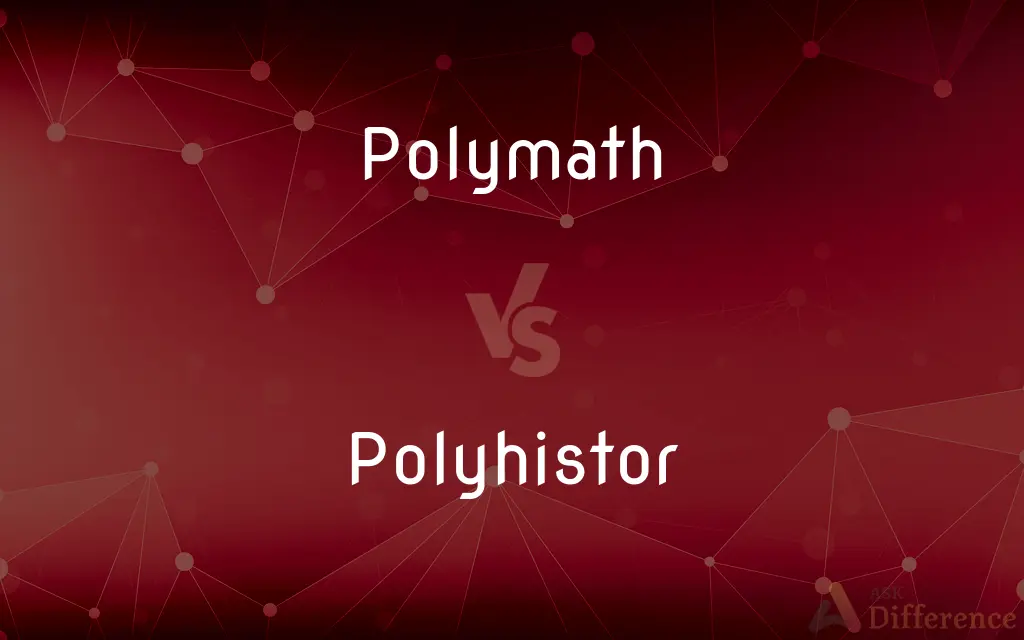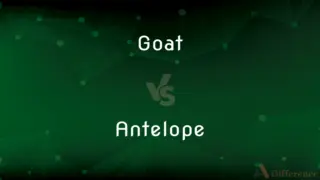Polymath vs. Polyhistor — What's the Difference?
By Tayyaba Rehman & Maham Liaqat — Updated on April 8, 2024
A polymath is someone with knowledge in many different areas, while a polyhistor is specifically well-versed in historical and literary subjects.

Difference Between Polymath and Polyhistor
Table of Contents
ADVERTISEMENT
Key Differences
Polymaths and polyhistors share a vast range of knowledge, but their areas of expertise tend to diverge. On the other hand, a polyhistor, while also possessing broad knowledge, tends to focus more on historical and literary scholarship.
While both polymaths and polyhistors are characterized by their extensive knowledge, the nature of their expertise differentiates them. Polyhistors, conversely, contribute significantly to our comprehension of historical contexts and literary evolutions. Their deep dives into the humanities enrich our understanding of human societies, past and present.
In essence, the difference between polymaths and polyhistors lies in the scope and application of their knowledge. Polymaths tend to engage with and contribute to multiple fields, often in a manner that fosters innovation and cross-disciplinary breakthroughs. Polyhistors, while equally knowledgeable, dedicate their intellectual pursuits to understanding and interpreting the human condition through historical and literary lenses.
Comparison Chart
Definition
Individual with wide-ranging knowledge across multiple disciplines
Expert in historical and literary scholarship
Key Areas of Expertise
Sciences, mathematics, arts, literature
History, languages, literatures
ADVERTISEMENT
Contribution
Cross-disciplinary innovations
Insights into human cultures and histories
Examples
Leonardo da Vinci
Edward Gibbon
Focus
Integration and application of diverse knowledge
Deep understanding of humanities
Compare with Definitions
Polymath
A person skilled in multiple fields.
She is a polymath who excels in music, mathematics, and literature.
Polyhistor
Focuses on languages and cultures.
As a polyhistor, his lectures on Renaissance literature are immensely popular.
Polymath
Synonymous with a well-rounded, highly educated individual.
As a modern-day polymath, he contributed to both the arts and the sciences.
Polyhistor
Specializes in the comprehensive study of history and literature.
The polyhistor’s latest book offers new insights into ancient Roman society.
Polymath
Characterized by a broad range of interests and knowledge.
The conference attracted polymaths from around the world, eager to share their research.
Polyhistor
Their scholarship often illuminates the interconnectedness of different historical periods.
Her work as a polyhistor has bridged gaps between ancient and modern world histories.
Polymath
Engages in learning and contributing across various fields.
Her polymathic abilities enabled her to solve complex problems in sustainable architecture.
Polyhistor
Offers deep analyses of literary works.
The polyhistor provided a groundbreaking interpretation of previously misunderstood medieval texts.
Polymath
Often pioneers in cross-disciplinary research.
The polymath developed a new theory at the intersection of psychology and artificial intelligence.
Polyhistor
Preserves and interprets historical knowledge.
The museum’s polyhistor curated an exhibit showcasing manuscripts from the medieval period.
Polymath
A polymath (Greek: πολυμαθής, polymathēs, "having learned much"; Latin: homo universalis, "universal person") is an individual whose knowledge spans a substantial number of subjects, known to draw on complex bodies of knowledge to solve specific problems. In Western Europe, the first work to use the term polymathy in its title (De Polymathia tractatio: integri operis de studiis veterum) was published in 1603 by Johann von Wowern, a Hamburg philosopher.
Polyhistor
A person with broad knowledge.
Polymath
A person of wide knowledge or learning
A Renaissance polymath
Polyhistor
Someone gifted or learned to a great extent or in multiple disciplines; a great scholar.
Polymath
A person of great or varied learning.
Polyhistor
One versed in various learning.
Polymath
A person with extraordinarily broad and comprehensive knowledge.
Polymath
A person of great and varied learning
Common Curiosities
What does a polyhistor specialize in?
A polyhistor specializes in historical and literary scholarship, focusing on the humanities.
What is a polymath?
A polymath is an individual with extensive knowledge and ability in multiple subject areas or disciplines.
What distinguishes a polyhistor’s contributions from those of a polymath?
Polyhistors contribute deep insights into human cultures and histories, while polymaths often pioneer cross-disciplinary innovations.
Do polyhistors publish their research?
Yes, polyhistors frequently publish their research, particularly in areas of historical and literary analysis.
Can a polymath be considered a polyhistor?
While a polymath could have knowledge encompassing history and literature, their broader focus across various disciplines doesn't confine them to the specialization of a polyhistor.
Are there modern-day polymaths?
Yes, there are individuals today who are considered polymaths due to their contributions to multiple fields of study.
How does a polymath contribute to society?
Polymaths contribute to society by integrating and applying knowledge across different fields, often leading to innovative solutions and advancements.
Is being a polymath limited to scientific fields?
No, being a polymath is not limited to scientific fields; it includes arts, literature, and any other area of knowledge.
What motivates a polymath?
Curiosity, a love of learning, and the desire to solve complex problems often motivate polymaths.
How do polymaths and polyhistors approach problem-solving?
Polymaths often use interdisciplinary approaches to problem-solving, while polyhistors may draw upon historical and literary contexts to provide insights.
Can someone become a polymath or polyhistor through formal education alone?
While formal education can provide a foundation, becoming a polymath or polyhistor typically requires a lifelong commitment to learning and exploration beyond formal settings.
What role do polyhistors play in education?
Polyhistors play a significant role in education by teaching and preserving knowledge across the humanities.
Can a polymath specialize in arts and humanities?
Yes, a polymath can specialize in a wide range of fields, including both the arts and humanities.
Why is the distinction between polymath and polyhistor important?
Understanding the distinction helps appreciate the specific contributions each makes to knowledge, culture, and society.
How important are polyhistors to the study of history?
Polyhistors are vital to the study of history, offering comprehensive insights and analyses that enrich our understanding of the past.
Share Your Discovery

Previous Comparison
Dip vs. Dive
Next Comparison
Goat vs. AntelopeAuthor Spotlight
Written by
Tayyaba RehmanTayyaba Rehman is a distinguished writer, currently serving as a primary contributor to askdifference.com. As a researcher in semantics and etymology, Tayyaba's passion for the complexity of languages and their distinctions has found a perfect home on the platform. Tayyaba delves into the intricacies of language, distinguishing between commonly confused words and phrases, thereby providing clarity for readers worldwide.
Co-written by
Maham Liaqat















































